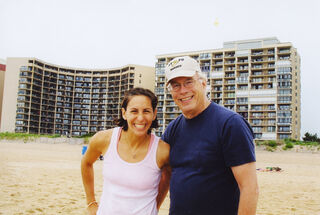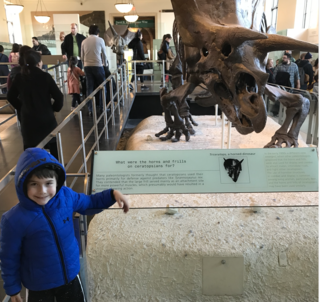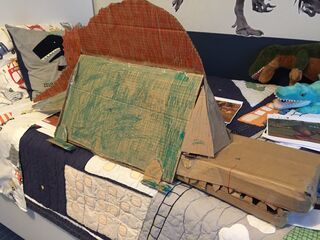Play
When Children Aren't Like Their Parents
My dad is a rocket scientist and I didn’t get basic algebra.
Posted June 17, 2021 Reviewed by Chloe Williams
Key points
- Genetics, environment and temperament influence a child's personality, proclivities and talents.
- Being present when spending time with a child can help parents and children bond and helps kids become flexible thinkers.
- Letting a child find and develop their own passions, and making time to play can also foster connection between parents and children.
For a long time, I didn’t think my dad and I were much alike.
Steve Diamond likes facts.
I like feelings.
He never complains.
I like to kvetch.
My dad visits museums, takes work trips to London and does things that are predictable. I rock climb, take work trips to Iraq and love when things are uncomfortable.
I thought our differences came from life experience. I had it easy as a kid. My dad’s childhood was anything but.
One evening when he was 10, my dad said goodnight to his father and went to bed. His father, Sidney Diamond, died at age 47 from a heart attack in his sleep. My grandmother Lila was a bookkeeper. She was good with numbers but lacked warmth. She supported my dad and his younger brother Mike as best a single mother could in the 1950s, in a small house with a fridge, half-full.
My dad used his strength with numbers, shapes and equations to build possibilities. He got scholarships that paid for an Ivy League education and a Ph.D. in aerospace engineering.
Spreadsheets were his salvation. Facts were his family. With those, he felt in control. Capable. Resilient.

Can numbers and equations affect feelings?
When I discussed a problem with my dad, I wanted to dwell on it. He thought about solutions.
Like the time after college when I struggled to adjust to a desk job at a Washington, D.C., think tank. After graduating from the University of Colorado in Boulder (possibly the happiest place on earth), I took a year off – to rock climb in Europe and travel in the Middle East. Transitioning to the “real world” was tough.
“Dad, I am struggling,” I said.
“Let’s make a list of things that make you happy — and come up with a plan,” he replied.
He wanted to do something concrete. I mentioned that I missed climbing limestone and granite cliffs.
“Let’s build a climbing wall in your living room,” he suggested.
A week later, he drove from his house in New Jersey to Northwest D.C. and we got to work.
We cursed, sweat and carried sheets of plywood up five flights of stairs. We drilled, sawed and hammered that whole weekend.
On Sunday night, I said, “Dad, we did it! I feel great! You?”

“I want to double-check all the angles to make sure the structure is stable,” he replied.
For the next two years, I climbed every day after work. I grew stronger inside and out, becoming confident and happier.
I called my dad with many a problem over the next two decades. A canceled wedding. A failed marriage. Money challenges and work setbacks.
“Let’s make a list of options,” he always said.
I appreciated his approach, and with his help, I changed my life. I became a journalist, a war reporter and after a few false starts, I found true love. But I couldn’t lose the feeling that he didn’t understand me.
Having a child changed my perspective
Then I became a mother. I thought my child would be just like me. When Marty turned 3, I realized how misguided I was.
We were in Barnes & Noble and I was looking through children’s books, deciding between titles like The Boy with the Big Feelings and The Wonderful Things You Will Be. Marty came around the corner holding what looked like an encyclopedia.
“Mom!” he yelled. “I want this book!”
He handed me 1000 Fantastic Facts, a book with data, details and tons of minutiae about pre-historic creatures, evolution and all things science.
When Marty corrected a docent at the American Museum of Natural History, I understood that he was more like my dad than me.
The docent pointed to a giant skull and told our small group, “The Albertosaurus was a distant cousin of the T-Rex.”
“Excuse me,” Marty said. “That’s an Allosaurus, not an Albertosaurus.”
“No,” she said. “I work here and I know my dinosaurs.”
As I took out my iPhone and googled, Marty said, “There are two small crests by its eyes. Its skull is smaller. It’s an Allosaur,” he explained.

The docent paused. She turned her head to see the skull behind her and then slowly looked back at Marty. “He’s right,” she said. He was 4.
A few years later in a parent-teacher conference, Marty’s teacher explained that math was “an area of great strength” while writing was “a struggle.”
How could this be?
Finding ways to communicate through facts and feelings
I’ve spent decades feeling different than Steve Diamond. But Marty, over the last nine years, helped me discover that I missed the point. Feelings and facts aren’t exclusive.
Marty and my dad use information and numbers to make sense of the world and feel in control. Wasn’t I doing the same by writing and yakking about my mindset?
With his lists, equations and spreadsheets, my dad taught me to be brave. To try new things. To find passion and meaning. To feel optimistic about life’s possibilities.
Our common language: resilience
It came together one weekend when Marty was frazzled. I wanted to do something to help him feel strong and shift his mindset.
I said, “Let’s make a list of options – things that make you happy.”
Marty wanted to create a 3-D Labrynthodontia. I googled the pre-historic amphibious creature while my dad, who was visiting, found some old cardboard boxes.
“This feels exciting!” my dad exclaimed. “But it’s going to be challenging.”
Marty came up with a four-page, step-by-step set of instructions.
“Get the scissors grandpa!” Marty yelled. “We can do it!”
As my dad started cutting cardboard, I read through Marty’s instruction manual. It reminded me of my dad’s climbing wall design. The symbols were his words. His way of communicating. With shapes and numbers, he feels hope. Courage. Strength.
After three hours, we finished building the Labrynthodontia, with 50 teeth, a triangle tongue, sharp claws with nails, and a pointed sail.

“Marty, what a great accomplishment!” my dad said with a huge smile. “I feel great! What about you?”
“Me too grandpa!” he said. “Next I want to make a T-Rex robot!”
I jumped in. “That sounds like an awesome plan!” I said. “Can I help too?”
Sum it up
It is impossible to predict a child’s personality and disposition. Dr. Camilo Ortiz, a clinical child psychologist and professor at Long Island University, works with school-age kids. He says that genetics and nature play a powerful role in shaping a child’s mindset. While environment matters, Dr. Ortiz said, “the power of temperament is so strong.” He works with families to “find the right match between an approach and your child.” My dad used his skills and strengths to meet my needs. I am trying to do the same for my son by following his lead.
3 tips to bond with your child
1. Be present
Forget checking your email or text messages. Spend time with your child without worrying about what’s next. Dr. Ellen O’Donnell, a child psychologist who teaches at Harvard Medical School, says focusing on the present, not the future, will help kids become flexible thinkers. That, she says, will “bring all kinds of rewards” like a greater ability to adapt and overcome adversity.

2. Tap into your child’s interests
Spend time doing what your child loves and help him/her/them develop their own interests. Dr. Peter Gray, an evolutionary child psychologist at Boston College (and a Psychology Today blogger), believes when children find their own passions, they “feel more in control.” That he says, gives kids the chance to build confidence and resilience.
3. Just play!
Play is an essential activity for a young child. According to a report by the American Academy of Pediatrics, “Play allows children to use their creativity while developing their imagination, dexterity, and physical, cognitive, and emotional strength.” Parents can get down on the floor and have some fun, whatever the toy or game. It’s important to enjoy each other and give a child your undivided attention.




